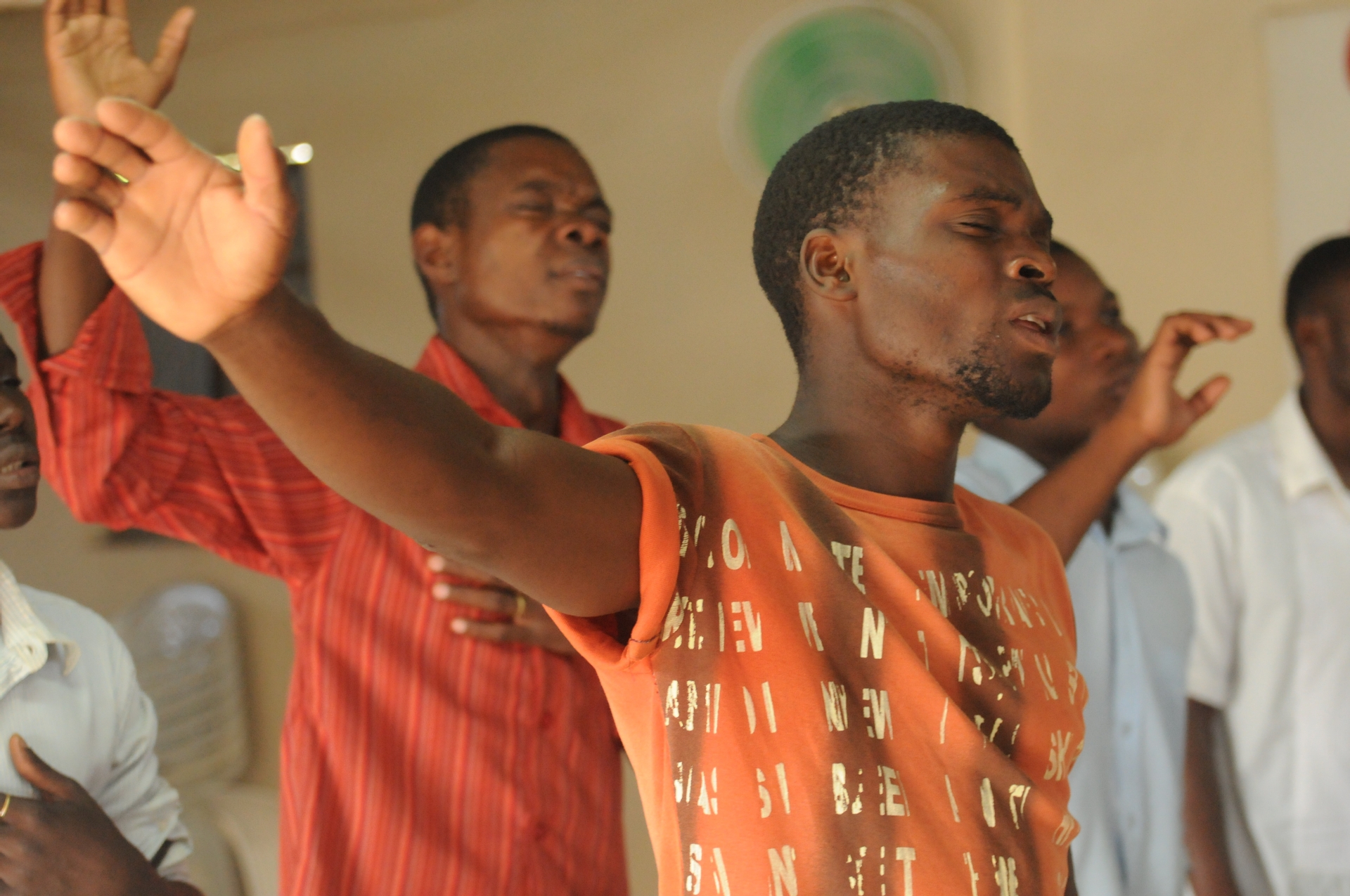cliquez ici pour lire la version en français
Where the sun is brightest, where all the main roads in Kimboh meet, the man sits and glares into thin air. The Harmattan breeze has come with great gifts: pieces of papers flying about in dust like confetti at a wedding. The man pulls close beneath him some of the dirt from the nearby heap, making good a cushion and says, “This here is my territory, here I am king.” His laughter can be heard all across the village. Every passer-by stares, most of them crinkle their nose as they walk by. All he sees is their tinted minds full of wickedness and hypocrisy. As he perceives the rusty metallic tang of their whispers, a ball of gob forms in his throat. He stands up to spit, but with a change of mind, decides to continue the song in his head. There is a melody for each day. Today the song is ‘Agatha’. The walk to Agatha’s house takes him across Kimboh, down towards the road leading to the Mbveh market—the main market. He looks at all the buildings and decides that Agatha’s house is the tallest building, the one with several windows. Agatha is his lone sister and he had always thought that if money were a person then it would look like Agatha; plump and fresh like well-watered lettuce. She was in charge of all of his needs: clothes, shoes, and food. He never forgot the road to Agatha’s house.
The man’s name is Edwin Amoben; they call him Amor. Some call him ‘Father’ and he dances to the sound of it. This Sunday, like most Sundays, he finds himself at St Martin’s Church, located a few kilometres from the main village square of Kimboh. It has a green, corrugated iron gate, with little flowers that line the rocky pavement. Accompanying it is the pastoral house and church hall. Amoben sits on the plank bench very close to the choir and, when they are about to sing the second verse of hymn 107, with a tap of his feet and eyes almost closed, his tenor is loud and clear:
All you who thirst come unto me,
Come have some wine for free,
Hunger and thirst shall pass away,
Come unto your God.
On Sundays, St Martin’s Church is usually packed full of people, their heads looking up to heaven as though waiting for God. From where Amoben is seated, he can see most people, especially Pah Lucas’ shiny, bald head. With a bright smile on his face, he turns to the boy seated next to him and says, “My troubles are as unending as this church.”
The people of Kimboh value Sundays—it is a day of communion, a day when smiles are given freely, reconciliations are spread generously, and every special food gulped carefully; the palm wine tastes better then. Sunday is Amoben’s favourite day, not just because of his attachment to God as a former seminarian, but because he believes there is something wonderful about going to church, being in a space of several people who have come to cleanse their souls just for that day. For those like him who have never missed a Sunday Mass in their lives, it is a shatter-proof habit. Sunday is his lucky day. On Sundays, the wind blows differently, the sun shines toothlessly, and if it rains, it comes in gush after gush of blessing. On Sundays, the voices in his head go elsewhere. Sunday was the day it began, the day he was certain it was going to end.
Amoben walks down the winding dirt path leading to the river, kicking every pebble in sight. Tall eucalyptus trees flank both sides of the path, giving off a fresh minty scent that is slightly choking. He plucks a branch, places it in his mouth and starts chewing.
I should clean my teeth before going to the white man’s land, he thinks. Could this river lead me to that place where my son is? That place where rays of Njobati’s smiles warm my heart. There is no place so far I cannot go to, not even the white man’s land. My legs are strong enough. One, two, three… twenty, yes I have to cross twenty rivers to get there. I must see them.
He is about to cross the second river when a form takes shape before him. The wind suddenly stands still sweeping gently across his unclad body parts; he has forgotten some of his clothes at the village square. He sways on one foot, and looks again; there is his baby crawling slowly over the shaky, slightly broken bridge, with a smile revealing his first budding tooth. He scurries towards Baby and then stops in his tracks thinking: My baby should be left to play; my baby should be free and strong like me. Amor further takes long steps towards the baby, but before he gets there, he sees Njobati. She pulls the baby to herself and screams, “Don’t touch my baby, go and get your clothes.”
Ignoring them, he squats on the wet rock by the river and says, “I was supposed to be a priest and share Holy Communion to all the villagers.” Little droplets of tears slide down his cheeks.
*
Just one more year left to be ordained a priest, Amoben had to do some community work. He decided to teach in a community school. What better place than his home, Kimboh? He loved how the beautiful hills stood tall and mighty, almost as if to protect the land. How every quarter seemed to be on a hill, making it seem one was either always climbing or descending. A land of extreme weather; the dust stuck to everything and everyone during the dry season, and the rain, with its mud, held one captive during the rainy season. Time appeared to wind down slowly in Kimboh. It was a village of curious people, so closely linked you could hear clear statements like:
“Did you hear that Pah Pius didn’t return to his house last night?”
“Yes, I hear he has kept another woman at Mbveh.”
The conversation would go on and on about different random topics.
He was glad to be once more reunited with people so kind and welcoming, who always speculated that taking a vow of chastity and poverty, wearing white robes, could make one ‘special’. He could already smell the fruity juices of the experience he would have while serving his community.
The community school lay at the top of the hill. It was made up of several classes that formed an L-shape. At the centre of the school was its bell; a large iron suspended on a stump. It was sufficient for a stone to be hit on the bell, to call the attention of the students. The school was surrounded by vast fields that needed to be grazed on. It was a school so scarcely populated you could meet everyone—students and staff—at least once a day. Amoben had chosen to help the students with mathematics and religious studies.
The day they met, he had been sitting in front of the staff room, revising, when Njobati and her friend approached. He didn’t recall who the other student was, her name, or even their entire conversation. All he remembered was Njobati; how her eyes had squinted as she smiled.
Njobati Miriam lived a few metres from the Kimboh hospital found at the rear end of the village. They called their house ‘German House’ for it had very strong white walls with pillars made of black concrete stones. The several glass windows and large smooth tiles gave it a delicate and foreign feel. Her father was a stout, dark man who rarely smiled; her mother always had a careless look about her, almost as if all she thought about was her expensive jewellery and beautiful hair. They were staunch Catholic Christians, didn’t miss a Mass; everyone knew the seat on the third row of the second column was theirs. The Christians of St. Martin’s Church of Kimboh had permanent seats in the church such that they could identify a stranger from where he was seated.
Njobati had always been a great student, but not a good mathematics student. It bothered her so. She had such fire in her eyes that burned everything that resisted her gentle grace. Her skin always some hue of brown that made her look like she had just taken a bath.
She needed help in mathematics. It appeared she had a greater course to follow; one could tell she was meant for great things. Amoben had seen her struggle and struggle with figures. He decided to have extra classes every Tuesday and Saturday after school. Sometimes the other troubled mathematics students hadn’t shown up, but she was relentless. When class was over, she had walked home with him, carrying his bag to his little hut. An unfamiliar attraction had sprouted that had taken him unawares; made him restless then gave him peace.
*
Amoben is seated in the front row of the St. Martin’s Church. His fingers move in little successions slowly savouring the feel of every bead of the Holy Rosary. These tiny white beads have been with him for a while now. It had taken him so long to save for that precious piece; Rev Fr Romanus had brought it straight from Rome. He stops touching the beads to focus; his best moment is here, the purifying moment. The scent of the incense fills his spirit, and even though everyone is seated, he stands up, raising his hands, and says aloud, along with the priest:
“Take this, all of you, and eat from it. This is my body, which will be given up to you. Do this in memory of me.”
He adds a “cling-cling-cling” to accompany the usual bells rung during the consecration.
When Mass ends, he marches rapidly towards the village square. Just then, he realises his brownish-white shirt needs ironing, his half trousers need buttoning, and yet again, one of his shoes is not with him. He is about to sit under the electric pole, but changes his mind. He moves and sits next to the ancient carving of a ‘lost’ fon; it appears he is in dire need of company—that of a great person. Since it is Sunday, the pictures rush freely to his mind; he is there again at that moment.
*
The aura between them was always made of crackles of electric things; taut strings that could make new symphonies each time they touched. Every touch brought different waves of shivers all over his body, shivers he couldn’t shake off, not even with the strongest novena. That day, the weather had been icy and unsmiling. All the years of growing up in Kimboh hadn’t prepared him for that kind of influenza. He lay there shivering, unable to go to school. Njo had shown up at his hut. She was wearing a pale-blue T-shirt that gently clung to her. That sight haunted his thoughts and dreams. She came the day after, and the day after that, to help him take his medication. That day she was seated at the edge of the bed to help him eat. He shifted closer, thinking if she moved away it would be his cue not to go on. She didn’t, she sat there unmoving, and when their lips met, he could tell her whole being trembled too. Their faces became all at once the same face. A face that had not existed until then: the pure, trembling face of desire. The kiss had remained with him, lingering on his lips like freshly tapped palm wine. Each time hadn’t been enough, so he tasted of that wine each time moving a step further…
That Sunday morning, after he’d returned to the seminary, he opened the letter he had kept for days and stared at the words, his heart somersaulted and did a hundred loops. He stared at the words again, tilted the paper slightly towards the light; maybe he was seeing it wrongly, maybe the light rays hadn’t touched all the words. It was a sunny day, and even though the sun danced about like a madwoman, touching everything in sight, he shivered.
Dear Amor,
I hope you are fine. Have you forgotten about me? I have been praying for forgiveness just like you asked me to. Last night I even prayed thirty Hail Marys, though I can’t find my rosary. The new Maths teacher is very cruel; he gave me a zero in his test. He talks too fast, and when we complain, he quickly wipes the board. Everyone in class keeps wondering if you will come to revise with us before the final exams.
There is something I must tell you: I haven’t been well. Most mornings, my temperature goes up very high. I have been sleeping a lot, especially during classes. Everyone is complaining, even mummy. The other day, I burnt a whole pot of meat, because of sleep. I even threw up all my stomach’s contents in the toilet pot—thank God no one was around. I thought it was just malaria, until I missed my period. I am in trouble. My parents will kill me when they find out. Come back fast, I need help.
Yours faithfully,
Njobati.
That letter robbed Amoben of sleep; food was just a nuisance he couldn’t afford to think of. It was on his mind all day and all night. He dared not talk to anyone else about it; guilt was his new necklace, every time becoming smaller, tighter. He’d become an embodiment of betrayal to God. God who had called him, trusted him. He’d placed Njobati and his unborn baby in a challenging predicament. Days passed. The news didn’t leave him. It loomed over him, darkening his days, rendering him hopeless. Prayer became a far cry. Would He listen? Amoben was his own god now, a god that made mistakes, a lost god. One who had to take responsibility for his actions.
He packed his luggage and left the seminary. No one knew if he would return. He wasn’t sure either. They wouldn’t let him see her. He couldn’t be with her while she struggled alone; the body changes, the food cravings. He couldn’t hold her in his arms and ask her to count on him. Her father threatened to lock Amoben up; the only thing that stopped him was his great respect for the church.
He willed himself to stay away from her but couldn’t. He went to church those days to see if she was there, to be in that presence that calmed his stormy soul, to look squarely at people who now whispered when he walked by. The courageous ones mostly asked:
“Father, when are you going back to the seminary so that I can fry garri for you to take along?”
“Soon,” he always replied.
So they kept whispering because he didn’t go away.
Several months ran by. Sometimes tiptoeing, making no sound, as he gobbled the several loaves of fufu corn his mother usually cooked. Sometimes, the days flew and flew like birds right up in the sky that never perched.
It was a lazy morning for him. He’d stayed in his little hut silently, brooding and nodding. He heard a knock at his door, one which he ignored. He wasn’t expecting anyone that day. Since the knock persisted, he opened to find a little boy who handed him a little piece of paper. “Aunty said I should give this to you,” he said.
Dear Fr Amoben,
This note is going to be the last you receive from me for I am going away, far away. My parents don’t want disgrace. We are going away. We must leave for France as soon as possible; I will be going to the nunnery. When Dad suggested this, I thought it a good idea; I get to look after the baby while he is in the orphanage. I get to atone for my sins. Don’t look for us, it won’t do you any good. And don’t you go around telling people about the baby; it won’t be good for my family, the church and for you.
Best regards.
He read this several times, each word like a spear stuck further down his heart, stealing his words. For several months, he stared wide-eyed ahead, always holding on to his lone source of strength—silence. Not even Agatha was able to disentangle the words from his head.
*
The morning Amoben starts talking, the sky throws up without warning. He leaves the church and then thinks to himself, This church place is stuffy oh. Why do they try to tell me about God? I know who God is. I have seen Him somewhere in her eyes, when she stared at me. I see Him in the air as these little particles fly about, pushing against each other. He has not prayed for a while now; the words just don’t come out. This day they come out in screams at the village square, at the top of his voice.
He yells.
“Njobati!”
“Calamai!” (He had given his baby a name as a father should).
“Nyuy Ta-ta!”
Onlookers glare in amazement. Why involve God?
He wakes up the next day in his hut, his entire body saturated with sweat, enough to fill a well. Chains bind his wrists and ankles. He wonders, Who is trying to restrain me and why? What wrong have I done? I just want to see my son and Njobati. He turns around his room but can’t recognise the air, which is so acrid his eyes sting with unshed tears. Everything reeks of urine, hot sweat, and something else. The two main holes on the floor of his room smile and he can hear them saying, Welcome back. One can tell they have been there for a long time, like an old, untended wound. A strong wind blows in gently, and with it comes a compelling feeling that makes him wonder if he is asleep or fully awake. There is movement around his chair. When he turns to check, he sees her seated on the lone rocking chair—Njobati, with baby Calamai. He tries to break the chains but they continuously cling to him. He struggles to no avail. Seeing him struggle, she moves towards him and, using her little finger, sets him free.
“Get some rest; you have been struggling for long now,” she says. “When you get up, you are going back to the seminary.”
Amoben lies down and closes his eyes. Great slumber consumes him. He wakes up with one resolve.
“Come, let’s go to the village square; everyone must see my son,” he says as he holds his son in his arms.
This blissful moment can make eternity a day—the hours, minutes, and seconds slowly ticking. If God is love and love is God, then Njobati and Calamai were gods, his gods; those he constantly sought for and worshipped. To him, life has been a string burning at both ends, never quite reaching the centre. So he waits and waits till the heat of the flame overwhelms him.
“Sane Sundays” is from Your Feet Will Lead You Where Your Heart Is






